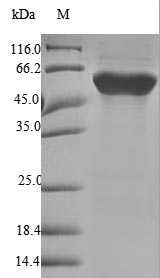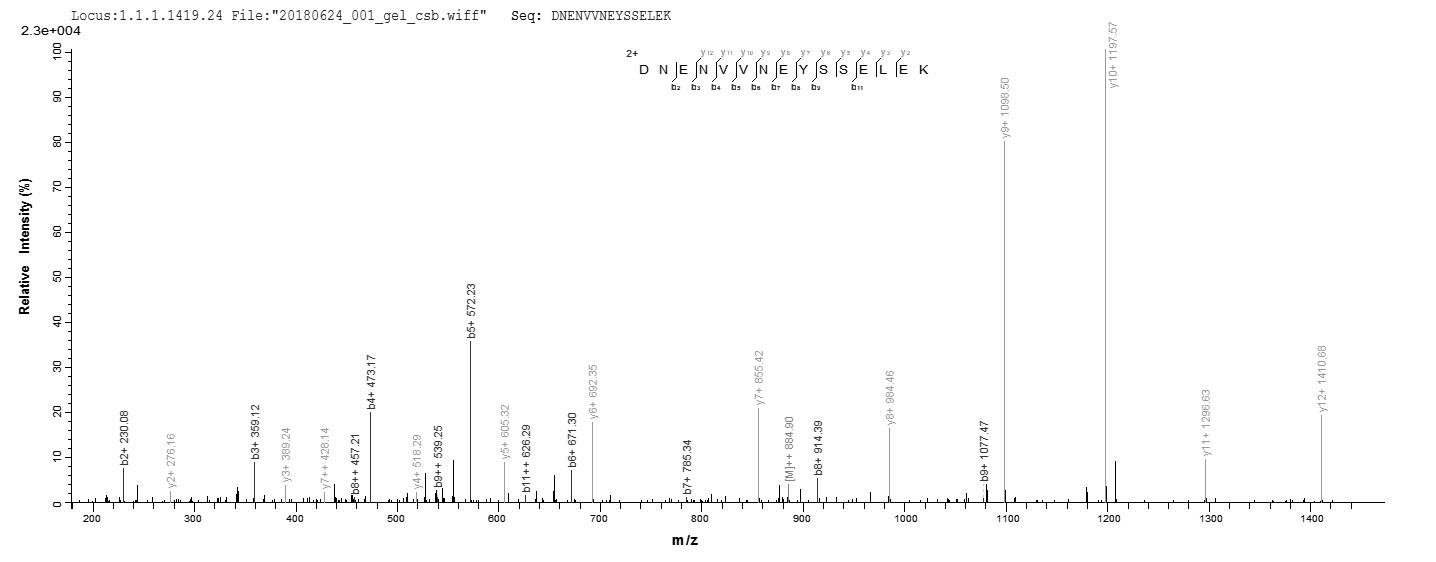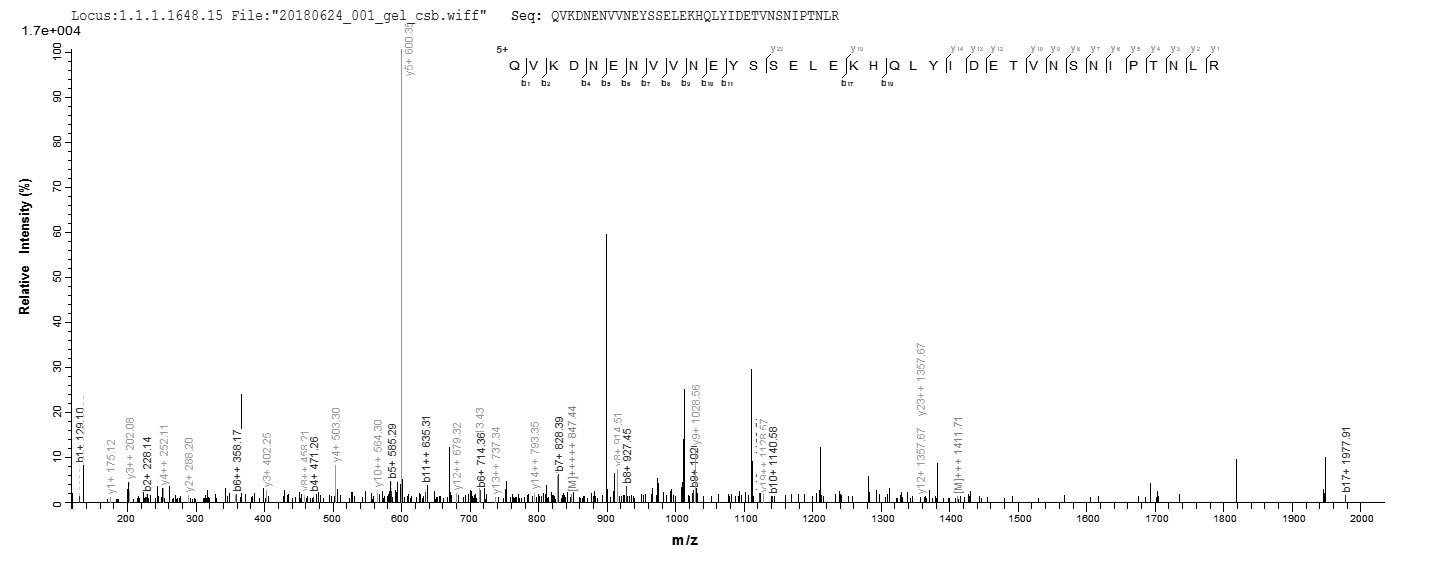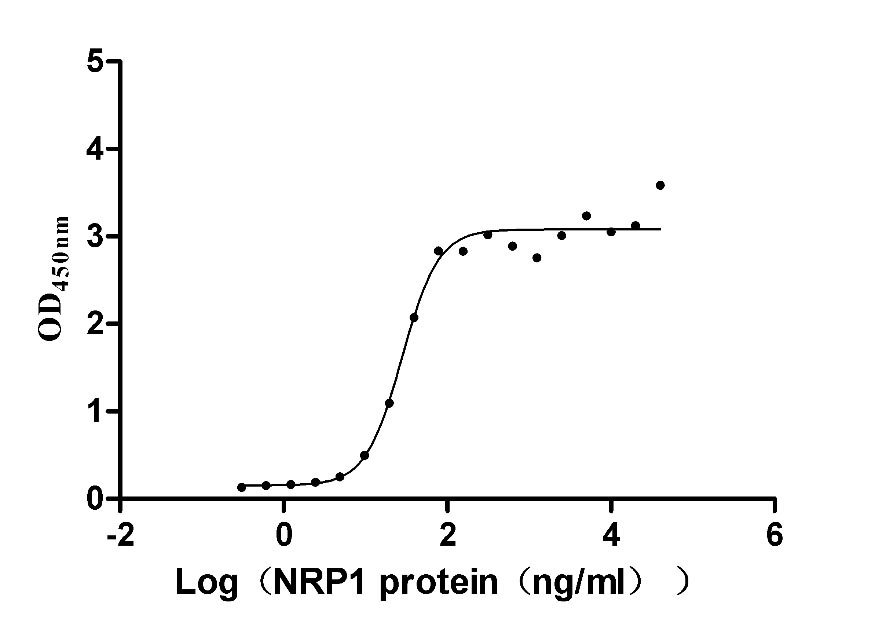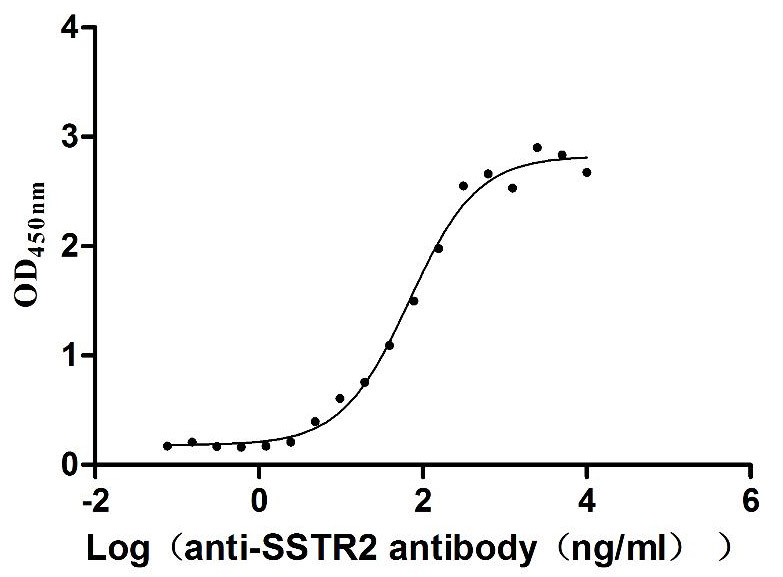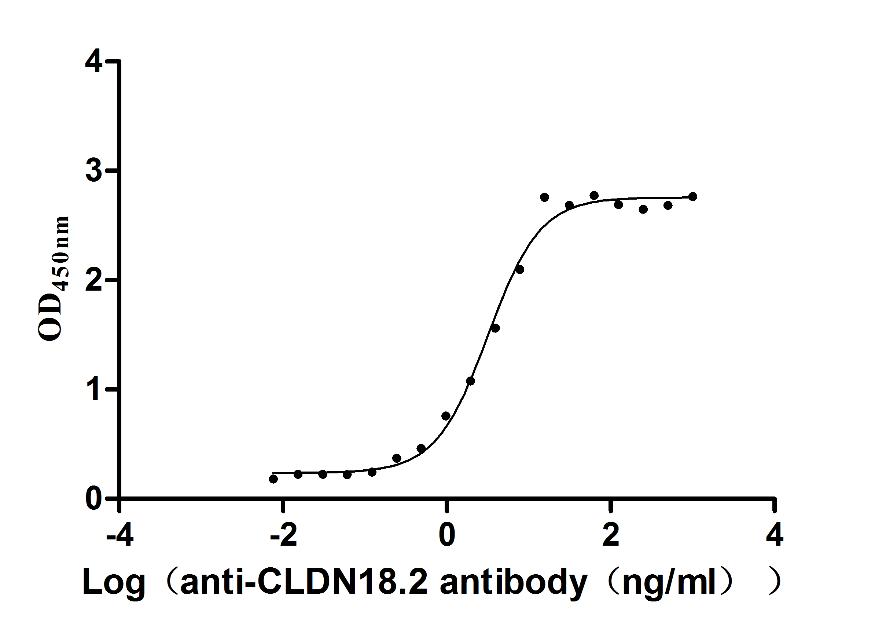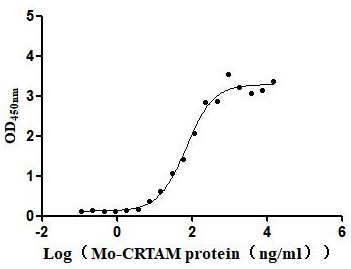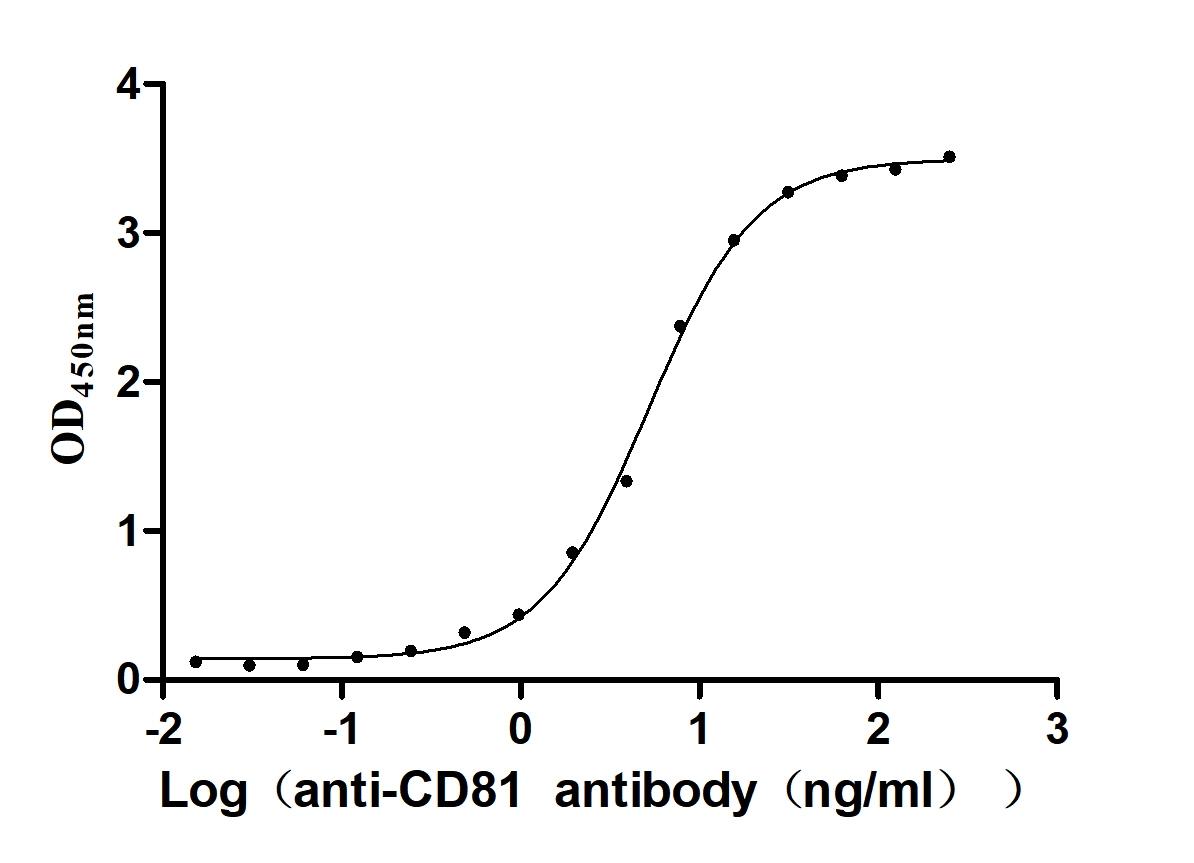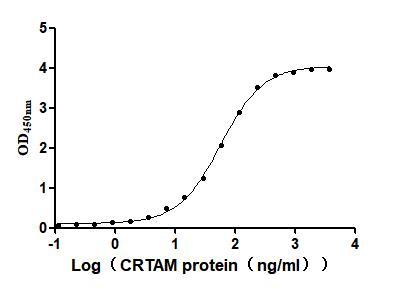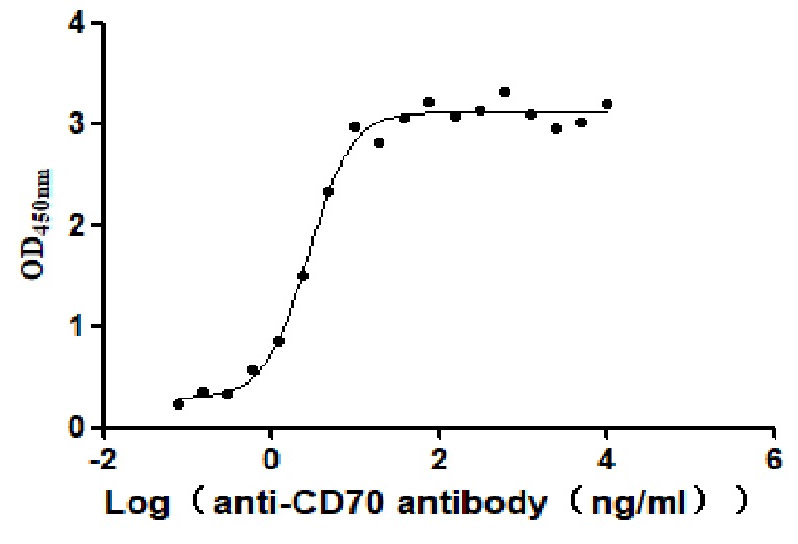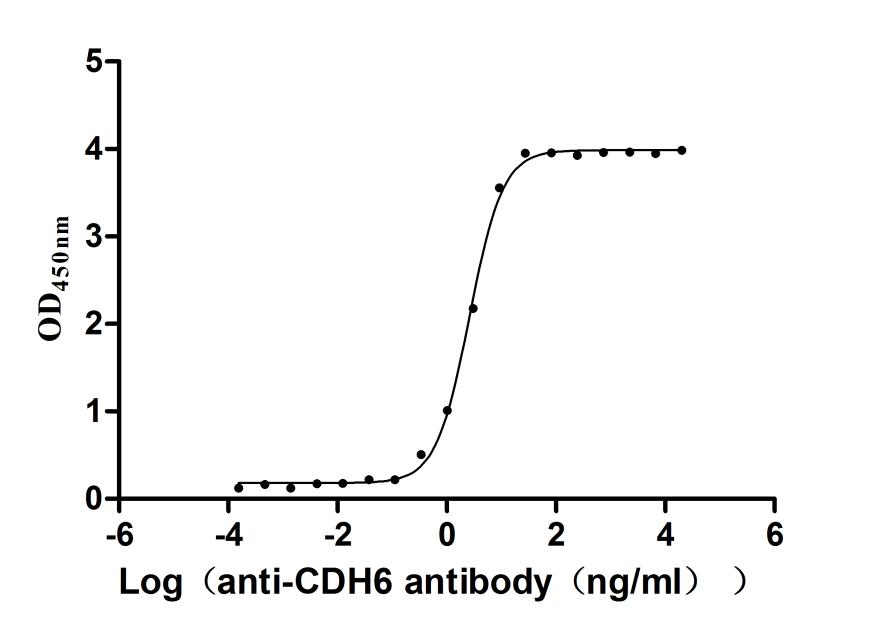Recombinant Human Fibrinogen beta chain (FGB), partial
In Stock-
中文名稱:人FGB重組蛋白
-
貨號:CSB-EP008608HU
-
規格:¥1344
-
圖片:
-
(Tris-Glycine gel) Discontinuous SDS-PAGE (reduced) with 5% enrichment gel and 15% separation gel.
-
Based on the SEQUEST from database of E.coli host and target protein, the LC-MS/MS Analysis result of CSB-EP008608HU could indicate that this peptide derived from E.coli-expressed Homo sapiens (Human) FGB.
-
Based on the SEQUEST from database of E.coli host and target protein, the LC-MS/MS Analysis result of CSB-EP008608HU could indicate that this peptide derived from E.coli-expressed Homo sapiens (Human) FGB.
-
-
其他:
產品詳情
-
純度:Greater than 90% as determined by SDS-PAGE.
-
基因名:
-
Uniprot No.:
-
別名:Beta fibrinogen; Epididymis Secretory Sperm Binding Protein Li 78p; FGB; FIBB_HUMAN; Fibrinogen beta chain; Fibrinogen; B Beta Polypeptide; HEL-S-78p
-
種屬:Homo sapiens (Human)
-
蛋白長度:partial
-
來源:E.coli
-
分子量:54.8kDa
-
表達區域:45-491aa
-
氨基酸序列GHRPLDKKREEAPSLRPAPPPISGGGYRARPAKAAATQKKVERKAPDAGGCLHADPDLGVLCPTGCQLQEALLQQERPIRNSVDELNNNVEAVSQTSSSSFQYMYLLKDLWQKRQKQVKDNENVVNEYSSELEKHQLYIDETVNSNIPTNLRVLRSILENLRSKIQKLESDVSAQMEYCRTPCTVSCNIPVVSGKECEEIIRKGGETSEMYLIQPDSSVKPYRVYCDMNTENGGWTVIQNRQDGSVDFGRKWDPYKQGFGNVATNTDGKNYCGLPGEYWLGNDKISQLTRMGPTELLIEMEDWKGDKVKAHYGGFTVQNEANKYQISVNKYRGTAGNALMDGASQLMGENRTMTIHNGMFFSTYDRDNDGWLTSDPRKQCSKEDGGGWWYNRCHAANPNGRYYWGGQYTWDMAKHGTDDGVVWMNWKGSWYSMRKMSMKIRPFFPQQ
Note: The complete sequence may include tag sequence, target protein sequence, linker sequence and extra sequence that is translated with the protein sequence for the purpose(s) of secretion, stability, solubility, etc.
If the exact amino acid sequence of this recombinant protein is critical to your application, please explicitly request the full and complete sequence of this protein before ordering. -
蛋白標簽:N-terminal 6xHis-tagged
-
產品提供形式:Liquid or Lyophilized powder
Note: We will preferentially ship the format that we have in stock, however, if you have any special requirement for the format, please remark your requirement when placing the order, we will prepare according to your demand. -
緩沖液:If the delivery form is liquid, the default storage buffer is Tris/PBS-based buffer, 5%-50% glycerol.
Note: If you have any special requirement for the glycerol content, please remark when you place the order.
If the delivery form is lyophilized powder, the buffer before lyophilization is Tris/PBS-based buffer, 6% Trehalose. -
儲存條件:Store at -20°C/-80°C upon receipt, aliquoting is necessary for mutiple use. Avoid repeated freeze-thaw cycles.
-
保質期:The shelf life is related to many factors, storage state, buffer ingredients, storage temperature and the stability of the protein itself.
Generally, the shelf life of liquid form is 6 months at -20°C/-80°C. The shelf life of lyophilized form is 12 months at -20°C/-80°C. -
貨期:3-7 business days
-
注意事項:Repeated freezing and thawing is not recommended. Store working aliquots at 4°C for up to one week.
-
產品描述:
CUSABIO transfected the expression vector which inserted the recombinant DNA into the E.coli, cultured the cells, and then induced the transcription and translation of the cloned vector. The N-terminal 6xHis tag sequence was appended to the gene coding for the E.coli of the human FGB protein to form the recombinant DNA. The recombinant human FGB was expressed as N-terminal 6xHis-tagged fusion. The purity of the protein is greater than 90% assayed by SDS-PAGE. It has an apparent molecular weight of approximately 60 kDa.
Fibrinogen is a large, complex, fibrous glycoprotein with three pairs of polypeptide chains linked together by 29 disulfide bonds. Fibrinogen is the major plasma protein coagulation factor. Low plasma fibrinogen concentrations are therefore associated with an increased risk of bleeding due to impaired primary and secondary haemostasis. Fibrinogen is a classical positive acute-phase reactant protein and is an independent predictor of coronary heart disease events. Plasma fibrinogen is an important component of the coagulation cascade, as well as a major determinant of blood viscosity and blood flow. Increasing evidence from epidemiological studies suggests that elevated plasma fibrinogen levels are associated with an increased risk of cardiovascular disorders, including ischaemic heart disease (IHD), stroke and other thromboembolism. This increase in plasma fibrinogen levels may promote a prothrombotic or hypercoagulable state, and may in part explain the risk of stroke and thromboembolism in conditions such as atrial fibrillation.
-
Datasheet & COA:Please contact us to get it.
相關產品
靶點詳情
-
功能:Cleaved by the protease thrombin to yield monomers which, together with fibrinogen alpha (FGA) and fibrinogen gamma (FGG), polymerize to form an insoluble fibrin matrix. Fibrin has a major function in hemostasis as one of the primary components of blood clots. In addition, functions during the early stages of wound repair to stabilize the lesion and guide cell migration during re-epithelialization. Was originally thought to be essential for platelet aggregation, based on in vitro studies using anticoagulated blood. However subsequent studies have shown that it is not absolutely required for thrombus formation in vivo. Enhances expression of SELP in activated platelets. Maternal fibrinogen is essential for successful pregnancy. Fibrin deposition is also associated with infection, where it protects against IFNG-mediated hemorrhage. May also facilitate the antibacterial immune response via both innate and T-cell mediated pathways.
-
基因功能參考文獻:
- High fibrinogen expression is associated with esophageal carcinoma. PMID: 29134563
- Compared with the patients with TT genotypes of fibrinogen beta, expressions of fibrinogen, IL-6 and CRP were significantly higher in the patients with the CC and CT genotypes. PMID: 29165755
- Two novel fibrinogen Bbeta chain mutations in two Slovak families with hypofibrinogenemia/afibrinogenemia have been described. PMID: 29286337
- FGB c.490G>A indicated the activation of a cryptic splice site causing the insertion of 99 bp in intron 3. This splicing abnormality led to the production of a Bbeta-chain possessing 33 aberrant amino acids, including two Cys residues in the coiled-coil domain. Therefore, a splicing abnormality may cause impaired fibrinogen assembly and secretion. PMID: 29156616
- FGB mutations leading to congenital hypofibrinogenaemia PMID: 28306188
- Fibrinogen Bbeta448Lys variant is associated with thrombotic fibrin clots in type 2 diabetic patients independently of traditional risk factors. PMID: 27929198
- There was underexpression of the majority of genes after sunitinib treatment. The lower expression levels of IGFBP1, CCL20, CXCL6 and FGB were confirmed by qRT-PCR in all cases. The downregulation of gene expression leads us to search for methylation as a mechanism of action of the tyrosine kinase inhibitors PMID: 27834463
- elevated levels of plasma homocysteine /homocysteine thiolactone contribute to AD pathology via the Abeta-fibrin(ogen) interaction PMID: 27090576
- procoagulant changes in fibrin metastructure appear to result from excessive carbonylation of fibrinogen, which may compensate for a decrease in fibrinogen level in patients with cirrhosis PMID: 26833718
- Prognostic impact of plasma fibrinogen levels in patients with esophageal squamous cell carcinoma PMID: 28064398
- a tight cluster of alternating multiple splicing regulatory elements and U1 snRNA binding sites controls cryptic splice donor usage throughout the human fibrinogen Bbeta-chain gene (FGB) exon 7 PMID: 28039323
- The plasma fibrinogen level was found to be a possible biomarker for clinical response to chemotherapy and postoperative metastasis or death in advanced breast cancer patients who received neoadjuvant chemotherapy PMID: 28621233
- Data suggest that, in the binding of fibrin beta N-domains and the (1-8) peptide fragment of VLDLR (very low density lipoprotein receptor), the second and third Lys/Arg clusters in fibrin make major contributions to this interaction while the contribution of the first cluster is moderate. PMID: 28437098
- The novel missense mutation in the FGB gene causes afibrinogenemia most probably by affecting the secretion of the fibrinogen beta-chain. PMID: 27824214
- fibrinogen aggregation is accompanied by the formation of beta-sheet conformation, and induction of non-native helical segments in the protein inhibits aggregation PMID: 27150313
- fibrinogen is an independent predictor of the angiographic presence of coronary artery disease in hypertensive patients. PMID: 27553289
- novel mutation was identified in exon 2 of FGB caused by c.221G> T (dagger) substitution PMID: 27812779
- Our results show that higher levels of circulating chemerin, CRP, fibrinogen, and ESR are associated with an increased risk of developing colorectal cancer PMID: 26628300
- We assessed the diagnostic accuracy of a newly developed laboratory score-based on CA125, platelet count (PLT), C-reactive protein (CRP), and fibrinogen levels-in the preoperative diagnosis of adnexal mass PMID: 26499778
- the mechanical properties of individual fibrin fibers formed from blood plasma, were examined. PMID: 27028649
- Here we report a new B[beta] gene mutation (Fibrinogen St Kilda) identified in two Caucasian sisters with reduced fibrinogen level (1.2-1.6 g/L) during investigation for recurrent early miscarriages. PMID: 26308135
- desAB fibrin binds to prothrombin through the Bbeta26-42 amino acid residues and the formation of such a complex causes a non-enzymatic activation of prothrombin PMID: 26317125
- Strong positive association has been found between betatrophin, plasma fibrinogen (FBG), and insulin resistance in non-diabetic subjects. Correlations with FBG and insulin resistance were diminished in type 2 diabetes subjects. PMID: 26077345
- These experiments demonstrate, for the FGB-p.Asp185Asn mutation, a pathogenic mechanism not common for fibrinogen deficiencies, i.e. the hyperglycosylation of the Bbeta chain due to the introduction of a novel N-glycosylation motif. PMID: 26006300
- High plasma fibrinogen levels and platelet count are associated with esophageal squamous cell carcinoma. PMID: 25896470
- Results suggest that FGB -148 C/T and -854 G/A polymorphisms probably contribute to susceptibility of ischemic stroke in Chinese population. PMID: 25890854
- The results of the meta-analysis indicate that the -455 G>A polymorphism in the beta-fibrinogen gene is a susceptibility marker of ischemic cerebral infarction in the Chinese population. PMID: 25398500
- In the present study, we found that the -148C>T polymorphism in the FGB gene was significantly associated with ischemic stroke in a Chinese population [meta-analysis] PMID: 25867317
- This prospective study in 110 patients undergoing major cardiovascular surgery at risk of post-cardiopulmonary bypass bleeding compares fibrinogen level. PMID: 26011420
- the NGR motif in fibrinogen is the site that is primarily responsible for the interaction with resting alphaIIbbeta3 and is responsible for triggering platelet activation PMID: 25413489
- Elevated fibrinogen levels are associated with negative tumor response to therapy in rectal cancer. PMID: 25384698
- Four novel FGB mutations were identified in two afibrinogenemic (one new-born and one 30 years old male) and hypofibrinogenemic (a 49 years old female) patient, with heterogeneous thrombotic and bleeding phenotype PMID: 24560896
- plasma fibrinogen increase during ischemic stroke has a role in worse outcome PMID: 24531853
- meta-analysis suggests that the FGB-455G/A polymorphism contributes to susceptibility to ischemic stroke and coronary heart disease PMID: 24448059
- results of our meta-analysis suggested that the-148C>T polymorphism in the FGB gene is a susceptibility marker of ischemic stroke PMID: 24720800
- The A + genotype of the FGB -455 G/A polymorphism associated with poor survival among 55-71 years old Caucasian women in the Finnish stroke cohort. PMID: 24957141
- results indicate that FGbeta-455G/A polymorphism may be a susceptible predictor of ischemic stroke [meta-analysis] PMID: 24366241
- Elevated fibrinogen is associated with idiopathic sudden hearing loss. PMID: 24466284
- High fibrinogen levels are associated with gynecologic cancer. PMID: 25204086
- Both fibrinogen polymorphisms are capable to modify the atherosclerotic process via their effects on the coagulation cascade. PMID: 23931975
- The beta-fibrinogen -455G/A gene polymorphism is not a risk factor for ischaemic stroke in a Polish population. PMID: 23650004
- A meta-analysis of a Chinese population found that the FgB -455G/A and the -148C/T gene polymorphism was implied to be associated with coronary artery disease susceptibility. PMID: 23129316
- Both isoforms of the beta-chain of FIB discovered by 2D-gel electrophoresis are decreased in the Parkinson's disease group cerebrospinal fluid, compared to normal controls. PMID: 22889670
- Lys, as an inhibitor of protein glycation, improved fibrinogen's structure and function, both in vitro and in vivo. PMID: 22575419
- Fibrinogen polymorphisms contributes to the association between common variants in the fibrinogen gene and the risk of developing sporadic cerebral hemorrhage. PMID: 22386478
- study found that -C148T FGB polymorphism was an independent predictor of pre- and early postoperative C-reactive protein levels in coronary artery bypass graft patients PMID: 21499712
- genetic polymorphism is associated with plasma fibrinogen levels and haematological traits in whites, blacks and mexican americans PMID: 22273812
- Levels of fibrinogen and thromboelastometry fibrin polymerisation following treatment with desmopressin (DDAVP). PMID: 22293628
- The BF -455G/A polymorphisms was found to be positively. PMID: 21241403
- Fibrinogen has chaperone activity which is compromised upon glycation by methylglyoxal. PMID: 22053176
顯示更多
收起更多
-
相關疾病:Congenital afibrinogenemia (CAFBN); Dysfibrinogenemia, congenital (DYSFIBRIN)
-
亞細胞定位:Secreted.
-
組織特異性:Detected in blood plasma (at protein level).
-
數據庫鏈接:
Most popular with customers
-
Recombinant Human Neuropilin-1 (NRP1) (Active)
Express system: Mammalian cell
Species: Homo sapiens (Human)
-
Recombinant Human Somatostatin receptor type 2 (SSTR2)-VLPs (Active)
Express system: Mammalian cell
Species: Homo sapiens (Human)
-
Recombinant Macaca fascicularis Claudin 18.2 (CLDN18.2)-VLPs (Active)
Express system: Mammalian cell
Species: Macaca fascicularis (Crab-eating macaque) (Cynomolgus monkey)
-
Recombinant Mouse Cell adhesion molecule 1 (Cadm1), partial (Active)
Express system: Mammalian cell
Species: Mus musculus (Mouse)
-
Recombinant Human CD81 antigen (CD81), partial (Active)
Express system: Mammalian cell
Species: Homo sapiens (Human)
-
Recombinant Mouse Cytotoxic and regulatory T-cell molecule (Crtam), partial (Active)
Express system: Mammalian cell
Species: Mus musculus (Mouse)
-
Recombinant Human CD70 antigen (CD70), partial (Active)
Express system: Mammalian cell
Species: Homo sapiens (Human)
-
Recombinant Human Cadherin-6(CDH6),partial (Active)
Express system: Mammalian cell
Species: Homo sapiens (Human)

